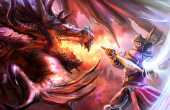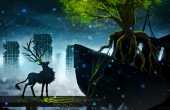N.D. Storlid
"A person is a fool to become a writer. His only compensation is absolute freedom. He has no master except his own soul, and that, I am sure, is why he does it" -Roald Dahl
Contributor II
- Plebian Penman
- Lurker
- Pssst
- Sharp-Eyed Citizen
- ?
- Articles
3 - Featured
3 - Comments
40
- Ext. Comments
22 - Processed
8 - Revisions
6
- Topics
4 - Topics Taken
1 - Notes
10
- Topics Proc.
7 - Topics Rev.
0
- Points
1138 - Rank
134 - Score
542
Latest Articles
Latest Topics
The Formatting and Style of WritingMost writers might be aware of the tedious rules that are involved in writing, particularly when they intend to publish in the media. Generally these guidelines are relaxed in the entertainment value of publishing, though there are larger expectations when dealing with other major groups, such as scholarly journals and education platforms.
|
Where Have All The Epics Gone?Since the time that the Epic genre has passed along some of the greatest works in literature, such as Homer’s Iliad and Odyssey, there is a noticeable gap in the attention it has received in spite of its influential past. The genre continues to enjoy periodical bursts of success that extends beyond the 13th century, and various works have maintained a status of exceptional etiquette among scholars of the literary discipline. The question is, why has there been fewer Epics written, and what has become of this style of literature?
|
The Bridges to GlobalizationIn the crowded space that is the media, the digital growth has left profound effects to which writing is contending to keep pace with. Primarily, though English has maintained itself to be the language of the cyber world, there is a consistent mingling of cultures and tongues that our entire world shares in. This topic is meant to provoke the questions about the assimilating values that have shaped the digital crowd, and what kind of adaptations are made to the languages we commonly speak. What can we gather and understand from these changes?
|
The World from our TelescopeIn the growing sensation that emerged from technology, a question has poised an interesting observation of what has defined the "Modern World" versus what has become of the rest of it. Technology has become the basis of most lifestyles in some first-world countries, and certain perspectives have changed resulting from it. Though information is immediate and accessible, there is a conception born that a more refined, and civilized society is growing from it, while many view implications from it. The theme here directs the question of a contingency; has the world developed from closing distance with technology, or are there signs that it should suffer otherwise? |
Latest Comments
| The Philosophy of Conflict in Literature | |
Also, I’d like to respond by mentioning that I believe the better way to approach your question is by touching on the way that I tend to write. You see I have a tendency to be incredibly vague (or how my grandmother describes it, “esoteric”), primarily because I play with language to that effect. But more importantly, I also make it a point to never answer directly about a subject, a habit that likely does not support a job writing articles (heh). For example, in writing poetry I do not tell people what a piece is about, I always emphasis that it is up to them to discern what the poem means, regardless how much clarity or obscurity may be present with the piece. I believe this was my approach to writing this article as well, because I think the nature of the piece would be been done a disservice if I attempted to give a direct answer to the questions mentioned earlier. I try to write in aims of giving to others the kind of thoughts and ideas that should arrive them at their own conclusions, and not necessarily one of my own, so that for every person they find the answers they would have been looking for in their attempts to read and learn from my writing. | The Philosophy of Conflict in Literature |
Heyo; The main question of the article is discerning the existence and purpose of conflict in literature, more or less in tying it to the reader’s desire to that of what literature reflects as a “device”, as you put it. In asking why conflict exists and is necessary *for* story based literature, I intended to avoid or at least restrict in defining conflict in literature, because that felt to be somewhat of a trap in answering that in literary context, not necessarily in one that is philosophical, which could have intermingled or muddled the arguments in the article. I did intend to touch on that to an extent, and draw from philosophical reflection and sources to muster an emphasis on that aspect, instead of trying to explain why conflict is necessary for literature. If I tried to answer the later by itself, I don’t think it would have helped to answer the question of the philosophical inquiry, of conflict in literature. And yes, I have read Aristotle’s Poetics, it’s one of my favorite philosophical works out there. In regards of that, I do think it holds some merit, but in my own research and inquiry, I don’t think it entirely holds in some regards to literature, particularly that it might have been because he had an early conception of narrative that I believe lends itself into a broader scope. Inevitably from reading various philosophers, I drew from those that I think possess heavy insight into the idea of conflict itself, which unfortunately I don’t think a lot of philosophers emphasis enough, as the focal point of understanding the conflict in literature. I wanted to touch on the subject with a more intimate relation to us as humans rather than a literary analysis that I feared would remove a critical part of answering this question. Anyway, I hope I gave a decent response to your questions. I would have loved to have drawn Nietzsche into this discussion as well, but I feared adding any more to the article would have interfered in the design and approach to it, as well as because I feared his ideas would have been difficult to present to the audience. Perhaps in an essay or other research piece I think I would have covered a great deal of ground, however in articles I learned that keeping it somewhat brief and clear to the point is something desirable, so in all honesty, this is something that could go to greater depth if pursued in other mediums, I have a lot of thoughts on this to be frank. Thanks for the question! | The Philosophy of Conflict in Literature |
I greatly appreciate it; it is interesting sometimes when some themes or topics that are so broad can often be forgotten or misplaced in these great discussions in the classrooms. I can’t say I bring much to the table when it comes to my own classes, but I like to draw perspectives on things that I don’t think I see much of, and shed some light in a way that we might all find direction. It’s fun when everyone shows something interesting and wholesome to these kinds of places. | The Philosophy of Conflict in Literature |
Whenever I think of conflict I tend to associate it in a way to time and movement in the story, which sometimes is how the reader is drawn in and influences their involvement in the pages. It’s an odd thing to describe, but it is something intimate and yet difficult to grasp, and with the way you describe it, there’s no telling to how it influences us. I sometimes wonder about conflict in varying aspects of literature that are not known for it, such as nonfiction or even informative prompts; it’s such a curious subject. | The Philosophy of Conflict in Literature |
More and more the varying aspects of equality begin to compromise on certain things that sometimes we are inadequately prepared to deal with, often in the forms of topics such as this one. I had the experience of interacting with several therapy groups of often unique situations, and I happened upon the same information about sexual violence that opened my eyes to a grand picture of the reality. It’s interesting seeing the shift toward these and how they are being confronted, and it does make me wonder that when, or if, we managed to overcome this obstacle, what might come next in the changing pace of equality. | Censorship: Post-Weinstein, and the Impact of Social Media |
Nostalgia blurs a little on my reflections on the show, always being that one that I found to be incredibly unique and interesting, although for reasons I wasn’t sure why at the time. Going into Samurai Jack’s revival was something else of an experience, in a way that parts of the show were not familiar to me having grown up, and provided reminiscence of a fascinating world that has been given new meaning. I felt the show had grown out just as most people had when they watched this show as a child, and perhaps that is what has made it all the more interesting to follow along, as the show grew and matured as we did later in our lives. | Samurai Jack: Exploring the Newfound Maturity |
Great article; I certainly find that animation comes under unnecessary fire, especially for the artistic liberty that it already possesses. Animation is maturing since it has been developed, and from certain shows like “Big Mouth” having begun to explore taboo subjects, it’s a resourceful medium that is slowly beginning to become an accepted resource for original ideas, where often those unprepared foolishly like to delve into. | The Double-Edged Stigma Faced By Western Animation |



I am indeed familiar with Nietzsche, he was a person I greatly considered drawing into this topic of conflict in literature, as I felt On The Genealogy Of Morals, as well as Ecce Homo, provide valuable insight into this matter on the basis of human nature. I chose Hobbes because he was a clearer and more direct influence to draw this idea upon, but Nietzsche’s would have been incredibly fun to delve into, especially in his analysis into Greek tragedy, where I think a great deal has still to be gathered for us to learn about literature.